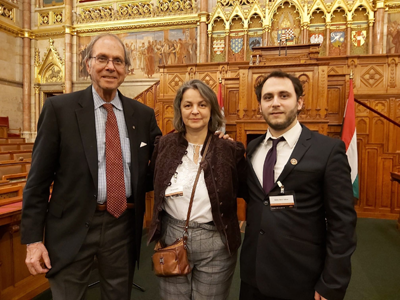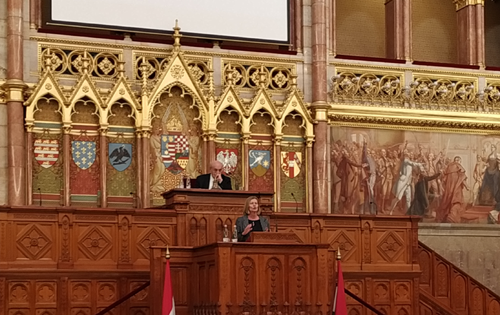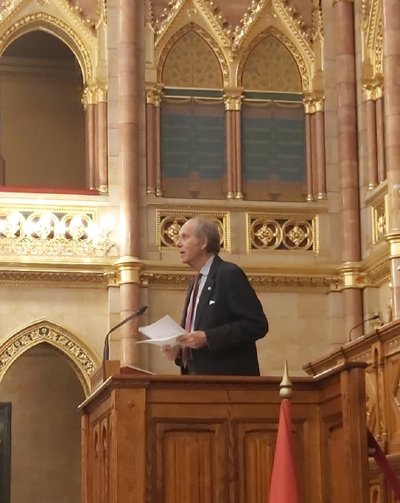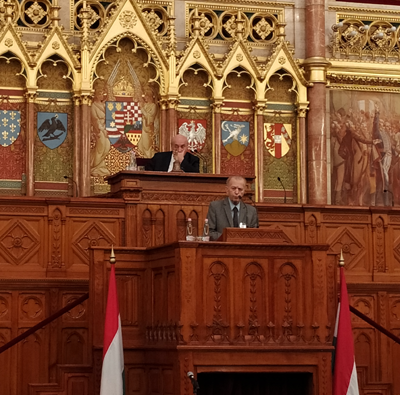
 |
Tweet |
 |
 |
|||||||
| The American Hungarian Federation Co-Sponsors Conference Commemorating the 75th Anniversary of the Foiling of Deportation of Jews to Nazi Death Camps. | ||||||||
11/14/2019 The American Hungarian Federation Co-Sponsors Conference Commemorating the 75th Anniversary of the Foiling of Deportation of Jews to Nazi Death Camps.- 
On Thursday, November 14, 2019, the Office of the Hungarian Parliament, the Ferenc Koszorus Memorial Committee and the American Hungarian Federation hosted a conference, the Fate of Rescuers in Dictatorships. The conference honored Colonel Ferenc Koszorus, whose military intervention 75 years ago prevented the deportation of close to 300, 000 Jews living in Budapest who were about to be sent to Auschwitz and other camps under horrific conditions. The conference, held in the stunningly beautiful Upper House of the Parliament, heard from historians and experts, whose scholarship focused on the armed resistance and rescue efforts of courageous Hungarians, who challenged the imminent deportation of Budapest's large Jewish population (swelled by Jewish refugees from neighboring countries) by Adolf Eichmann and the puppet Stojay government. 
Dr. Csaba Hende, Deputy Director of the National Assembly, greeted the standing room only gathering on behalf of the Parliament's President and eulogized Colonel Koszorus by recalling the words of the late U.S. Congressman Tom Lantos, a victim of the Hungarian Holocaust himself: "Colonel Koszorus' unparalleled action was the only case known in which an Axis power used military force for the purpose of preventing the deportation of the Jews. As a result of his extraordinary brave efforts, taken at great risk in an extremely volatile situation, the eventual takeover of Budapest by the Nazis was delayed by three and a half months. This hiatus allowed thousands of Jews to seek safety in Budapest, thus sparing them from certain execution. It also permitted the famous Raoul Wallenberg, who arrived in Budapest on July 9, 1944, to coordinate his successful rescue mission." The conference continued with the showing of a clip from the documentary, Becsület Útján (On the Road of Honor). Tibor Zinner, the Conference Chair, introduced the other panelists, including M. Sándor Kiss, who spoke about the military and civil resistance in Hungary, while researcher Nóra Szekér discussed the efforts of István Vasdényei, who was the captain of a Hungarian camp and assisted many of the inmates escape. Gábor Ujvári compared the pre-1944 anti-Semitism of some politicians with their post-1944 sympathies regarding the plight of the Jews of Hungary. György Haraszti, from the National Jewish University for Rabbinical Student, focused on the need to commemorate those Jews who worked side-by-side with their Christian counterparts in the rescue efforts of 1944, and how up until 1989 the communist government reclassified these Jewish rescuers as ''communist resistors." 
Mr. Koszorus, President Emeritus of the American Hungarian Federation, gave a memorable speech stressing that he was not at the conference so much as to give voice to his family's personal accounts of Colonel Koszorus. Rather, he stressed, he was there to entreat those few members of the academic community and journalists, who despite the growing number of documents, reminiscences, and historical research, nevertheless, belittle and distort the Koszorus Action, and thereby disappointingly blacken and distort the history of Hungarians and Hungary. 
Finally, Zsuzsa Hanto, the Ferenc Koszorus Memorial Committee chair, delivered a lecture highlighting the past failures and refusals to accurately record the activities of the 1944 rescue efforts, and how under forty years of communist dictatorship, the Marxist historical narrative refused to recognize the significance of these endeavors. In addition to Mr. Koszorus, other AHF members who attended this most important and informative conference included Yvette Boone, Csilla Banyai and Bert Kolus. AHF national president Akos Nagy joined the organization's delegation later that evening and noted that "we are proud to have been part of this much needed and noteworthy conference, especially considering that AHF's mission includes correcting misleading assertions made about Hungarians and their history." | Shortcuts: Related Articles
[ < back to AHF 1848 Commemorations] Shortcuts:
"All for the people and all by the people. Nothing about
the people without the people. That is Democracy, and that is the ruling
tendency of the spirit of our age."
The original recording on two wax cylinders for the Edison phonograph survives to this day, although barely audible due to excess playback and unsuccessful early restoration attempts. Lajos Kossuth is the earliest born person in the world who has his voice preserved. Since the audio is of such poor quality, here is it is transcribed in Hungarian and translated to English (special thanks to Louis Kossuth in North America)
|